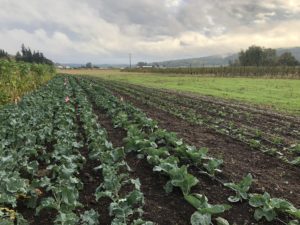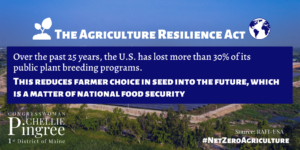
Seeds are self-propagating solutions to climate change if we steward them in a way that supports diversity, adaptability, and shared benefit. When growers plant their seed each spring, they rely on the genetics contained within each seed to survive pests and diseases, and to withstand variable weather.
From surviving high temperatures to the flavor and yield of the harvest, seed dictates the quality and security of our food supply, and therefore has an enormous impact on how we farm and what we eat. Thankfully members of Congress are taking notice.
Congresswoman Pingree’s Agriculture Resilience Act will result in more public cultivars that help growers adapt to, and mitigate the effects of, climate change. The bill has an overarching national goal of net zero emissions for the agricultural sector by 2040, and includes actions and initiatives in the areas of research, soil health, pasture-based livestock, food loss and waste, on-farm renewable energy, and farmland preservation and farm viability.

Sec. 206 of the bill focuses on public cultivar and breed research by creating the position of public breed and cultivar research coordinator within USDA. It also calls for the development of a strategic plan that focuses on delivering resource-efficient, stress-tolerant, and regionally adapted crop cultivars and livestock breeds that can help build agricultural resilience to climate change and support on-farm carbon sequestration and greenhouse gas mitigation.
Importantly, the bill requires increased investments in this area of research. The bill calls on the National Institute of Food and Agriculture (NIFA) to invest at least $50 million in 2021 in public cultivar development (increasing to $100 million by 2026).
“To address the impact of climate change on agriculture, we have to turn our attention to the first link in our food production chain – seed,” says OSA’s Kiki Hubbard. “Congresswoman Pingree’s H.R. 5861 will result in new public cultivars that help growers adapt to increasingly variable climates. Seed diversity is essential to building agricultural resilience. We applaud the Congresswoman for her leadership on climate change beginning with how we farm and the seed we plant.”
Take action!
If you are a farmer, make your voice heard on this issue by joining thousands of other farmers who have signed this letter addressed to Congress and the USDA to express concerns about climate change impacts on agriculture and to call for solutions that invest in our rural and agricultural communities.
